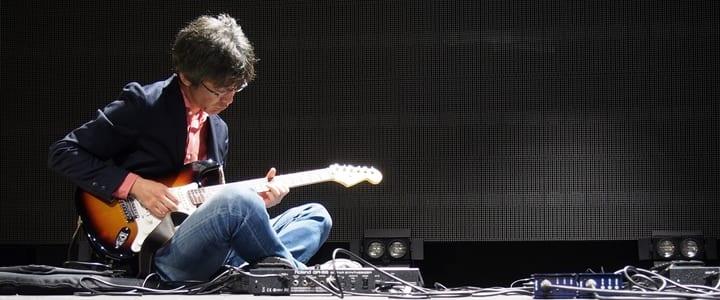https://www.youtube.com/user/takelessons/
Can you learn to sing on your own? Can you learn piano with online videos? Find out what works — and what doesn’t — when it comes to learning music, in this post by guitar teacher Kirk R...
Dreaming of playing an instrument, or learning to sing? These days, there are many different ways to get started with music.
You could take private lessons. You could play in groups, whether that’s in school, group classes, or just jamming with friends. You could even start learning on your own through observation, or search for prerecorded video or audio lessons.
But what’s the most effective way to learn? You might be surprised to learn that it’s NOT the options listed above.
That is, not on their own.
Let’s take a look at each one, and the benefits and drawbacks they present.
Learning On Your Own
Spending time with your instrument on your own is essential to getting better. Anyone you ask about learning music will surely support your own private practicing and desire to learn new things outside of classes, lessons, and rehearsals.
I recommend reading books and blog posts (like you’re doing now, good job!) and listening to other musicians, even those from other instruments or styles. Doing so will help you recognize what you like and what you don’t like.
However, if you’re not around other musicians regularly, it becomes very easy to let your playing get way off track. Your brain can trick you into thinking the sound you’re making or hearing is the same as the sound you tried to create, even if it’s not. And if this goes unchecked, it can lead down a long path of mistakes until one day you play for someone and they don’t recognize the song at all!
It’s important to have a regular “check-up” for your playing. Even professional musicians get together regularly to play for someone else! As a beginner, working with a private music teacher is key.
Consider This: Is it Possible to Teach Yourself to Sing?
While learning notes or chords on your own on the guitar can be a great starting point, singers trying to learn on their own tend to struggle.
Why’s that? Learning how to use your instrument (your voice!) is a whole-body experience, which often requires the instruction of a teacher, whether online or in-person, who can easily identify the root issues — whether that’s poor posture, unsupported breathing, or something else.
“Canned” Music Lessons
The internet is a huge part of our society now and I think it is a huge advantage to musicians everywhere. You can find tons of videos and online courses, and these types of lessons are a great way to gain some knowledge.
However, it’s important to keep in mind that prerecorded videos don’t tell you if you’re doing something wrong, let alone what it is. Similar to learning on your own, mistakes can easily become habits. I have had guitar students who learned chords on their own, and in their first lesson actually played all the chords upside down. Needless to say, it didn’t sound great, but they were used to hearing it and didn’t even notice the mistake.
If you want to learn the notes or chords for a specific song, YouTube is a great option. But if you’re looking for lessons with substance, steer clear of prerecorded lessons. The reason? These videos assume your prior knowledge of music, which isn’t always effective.
Learning music is not a linear process; in fact, teachers don’t always agree on the order certain things should be taught. Often, it depends on the particular student and their goals. This is why working with a teacher — who can create personalized lesson plans for you — makes a huge difference.
Consider This: Can you Really Learn Piano Online?
Many students are leery of online piano lessons. After all, how can a teacher properly see what you’re doing with your fingers and if you’re placing your hands correctly?
Fortunately, the answer is yes — and online lessons are a great option for many students. Experienced teachers know how to angle their camera so you can see their hands clearly, and will direct you to adjust yours so they can provide feedback. Just remember the advice above: don’t rely on canned video tutorials alone!
Group Music Classes
Learning to play music with others is essential for any musician of any style. Collaborating with other musicians will force you to pay attention to details, like precise rhythms and a careful balance in volume, which may sneak past you when playing on your own.
Many beginner students get their start in band or orchestra, and many adult students flock to group music classes because it’s less daunting than private lessons. However, I don’t recommend relying on group sessions alone if you really want to improve. The reason behind this is that with group classes, you will receive little, if any, individual help.
Likewise, more advanced musicians shouldn’t rely on jamming with friends to improve their skills. Other musicians may be able to share some skills, but even good players often make terrible teachers! Learn from them, but be cautious not to pick up bad habits or get frustrated if you’re not able to pick up something right away; perhaps your friend took a subtle skill for granted and didn’t think to explain it as an experienced teacher might.
Consider This: How to Find Musicians Near You
If you’re taking private lessons, but missing the group component, don’t fret!
Younger students, consider attending band or orchestra camps in the summer to get ensemble practice. Older students, try a free membership at TakeLessons Live where you can access online music classes led by live instructors in a variety of subjects.
Private Music Lessons
Individual lessons are a great starting place (and continuing place!) for almost any musician. Since your teacher is right there observing you, you’ll get feedback in real-time. And that can save you a lot of time searching on your own. In the midst of trying to get the right pitches, rhythms, and articulations, identifying when something is going wrong on your own can be nearly impossible, even for more advanced players.
The only drawback to individual lessons, however, is that you only receive one perspective on your playing: your teacher’s. However good the teacher is, as a musician and a teacher, they have only one perspective of many.
Consider This: How Do I Find the Best Music Teacher?
A simple search on TakeLessons can pull up tons of teachers for guitar lessons, piano lessons, and more. But how do you find the right teacher for your needs, goals, and schedule? We’ve got you covered. Check out our tips here.
So, How SHOULD You Be Learning Music?
Now that we’ve reviewed these four options for learning music, here’s my point: to really improve your skills, you need to combine all of the methods above. Here’s what I recommend:
- If you’re a part of a group class at school or in the community, sign up for private lessons as well to get individual help.
- Same goes for if you’re working your way through a prerecorded course or relying on videos. Take some time each week to meet with a teacher, to make sure you’re on the right track. With online music lessons, you don’t even need to leave your house! Review what you’ve learned in your course, and get their feedback on your technique.
- If you’re already taking private lessons, see if your teacher can connect you with other students to get some group experience. Most teachers will be thrilled to hear that you’re interested in collaborating with other students!
- Keep practicing and learning on your own, too. Treat practice like a lesson that you give yourself. If you’re not sure what to do to improve something, try searching online, or simply experiment! Ask yourself, “What if I use this finger? Or if I breathe here, instead?”
Have you been playing music for a while now? We’d love to hear what ways you went about learning. Leave a comment below and share your story!
 Post Author: Kirk R.
Post Author: Kirk R.Kirk is a classical, bass, and acoustic guitar instructor in Denver, CO. He earned a bachelor’s degree in guitar performance at The College-Conservatory of Music in Cincinnati and is currently pursuing a masters degree in performance. Learn more about Kirk here!
Photo by: Daniel Davis
Suzy S.
